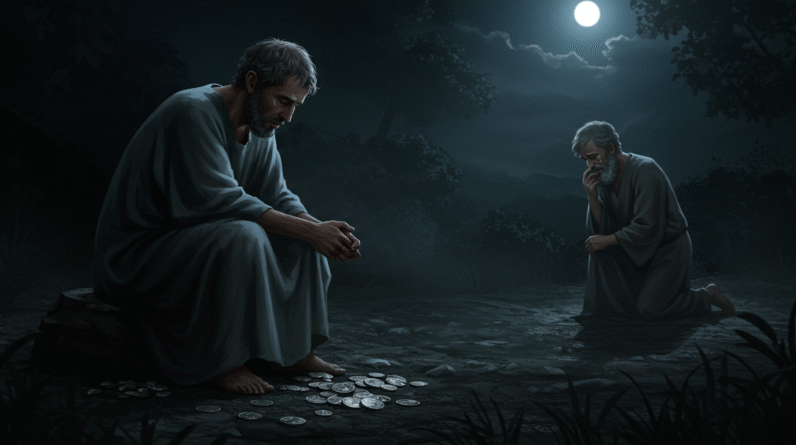Judas’s Guilt and Despair: Why He Couldn’t Find Forgiveness
Hey there! Today, we’re diving into one of the most haunting tales ever told—the story of Judas Iscariot. This isn’t just a tale of betrayal, but a wrenching narrative of guilt and despair that leaves you wondering why Judas, a pivotal character in the narrative of Jesus’s life, couldn’t find forgiveness. As you navigate through this article, we’ll take a hard look at what drove Judas into such depths of despair and hopelessness and how this contrasts with Peter’s path of repentance. Understanding “Judas guilt” isn’t just an academic exercise; it offers us life lessons on forgiveness and redemption that are surprisingly relevant even today.
The Weight of Betrayal
Judas Iscariot—his name almost feels synonymous with betrayal, right? Imagine being essentially defined by the worst thing you’ve ever done. For those unfamiliar with the details, Judas was one of the twelve apostles of Jesus. A trusted companion, or so it seemed, until that fateful night when he betrayed Jesus for thirty pieces of silver. Why did he do it? Speculation ranges from greed to disillusionment, but what stands out, undeniably, is his subsequent spiral into guilt and despair.
Judas betrayed Jesus with a kiss, an act that would lead to Jesus’s arrest and eventual crucifixion. This moment of betrayal is captured poignantly in Matthew 26:47-50. The emotional turmoil Judas must have felt after committing such an act could have been likened to a storm brewing inside his soul.
The Overwhelming Guilt
It’s challenging to fathom the crushing weight of guilt Judas carried. This was no ordinary mistake. The sheer magnitude of betraying the Messiah—someone who had shared meals with him, traveled with him, and entrusted him as a close companion—must have been an unbearable burden on his conscience. What’s fascinating is how Judas’s guilt unfolds, leading him to an ultimate hopeless despair.
“Judas guilt,” as one might describe it, was a unique psychological torment. Unlike Peter, another disciple who also failed Jesus by denying him three times (Luke 22:54-62), Judas didn’t see his failure as part of a redemptive narrative. Instead, he saw it as the end of his story.
The Hope Peter Found
Speaking of Peter, you might wonder why he found forgiveness while Judas couldn’t. Peter, too, was gripped by guilt and despair. Yet, what separated Peter from Judas was repentance—a turn back towards hope and a reconnection with Jesus post-resurrection (John 21:15-17). Peter wept bitterly after his denial, and it was as if those tears were cleansing, a sort of catharsis that paved the way for forgiveness and renewed purpose.
Peter allows his guilt to mold him into a better version of himself, accepting grace as a transformative gift. It’s as if he grasped an essential truth about forgiveness—that it isn’t about earning it but about receiving it.
The Despair of Judas
In stark contrast, Judas’s narrative took a darker turn. Stricken by remorse, he tried to return the thirty pieces of silver to the priests, declaring, “I have sinned by betraying innocent blood” (Matthew 27:3-4). But remorse isn’t quite the same as repentance, is it? Peter’s example reminds us that repentance involves a change of heart. Judas returned the silver, true, but he didn’t, or perhaps couldn’t, open himself to the grace that could have met him in his brokenness.
Then, tragically, Judas took his own life (Matthew 27:5). It’s a conclusion filled with profound despair, pointing to a soul unable to see beyond the shadow of its guilt. This raises the pressing question: What stopped Judas from seeking forgiveness?
Lessons on Forgiveness
The story of Judas is heavy, no doubt. But it’s laden with lessons. Judas’s story warns us about the destructive power of guilt when it festers without the balm of forgiveness. Holding on to guilt without seeking reconciliation leads to a cul-de-sac of despair.
Looking at Judas and Peter, we’re drawn to reflect on our own lives. Everyone makes mistakes—big ones, even. But there’s a world of difference between harboring guilt and choosing a path towards redemption. “Judas guilt” reminds us of the importance of not succumbing to despair but seeking a way back to joy and peace, often found through the simple yet powerful acts of apology, acceptance, and love.

The Unforgiving Mindset
Perhaps one reason Judas couldn’t find forgiveness was his mindset. A heart entrenched in self-loathing finds it hard to believe in the possibility of redemption. Judas may have deemed his act unforgivable, a belief that was self-reinforcing. If you persistently view yourself through the lens of your worst actions, it’s tough to accept any other narrative.
Consider, for a moment, the lens through which you see your mistakes. Are they final acts that define you, or are they stepping stones to personal growth and transformation?
The Role of Community
It’s worth pondering the role of community in both stories. After his betrayal, Judas isolated himself, while Peter stayed with the other disciples. Isolation can turn false beliefs about ourselves into apparent truths because there’s no one around to offer a broader perspective or to guide us back to our better selves. Shared burdens are lighter burdens. In the community, Peter found his way back to hope.
Acceptance of Grace
At the heart of these two narratives is the theme of grace. Both Judas and Peter needed it—one embraced it, while the other didn’t. Grace, in its essence, is unearned and freely given. Accepting forgiveness often involves relinquishing the notion that we have to earn it. Imagine if Judas could have understood this—that forgiveness was not beyond reach, but waiting as an open invitation. The story might have had a different ending.
The Choice We Face
As you reflect on “Judas guilt,” think deeply about the choices we face when confronted with our own failures. Will you isolate yourself in defeat, or will you reach out, seeking forgiveness and connection? This choice defines the path forward—not just in our spiritual lives but in our everyday interactions and relationships.
Moving Beyond Guilt
You can’t change what’s been done, but you can choose what you do next. Acknowledge your guilt, yes, but let it propel you towards growth, rather than chaining you to past mistakes. The beauty of humanity lies in its capacity for transformation. You are more than your worst day, more than your darkest decision.
Conclusion
The narrative of Judas’s guilt and despair offers a sobering reminder of the weight of unchecked remorse. But we don’t have to end up like Judas. Instead, we can choose the path of Peter—acknowledging our missteps, seeking forgiveness, and embracing the grace that’s always, surprisingly, available.
Your journey might involve personal reflection, seeking support from loved ones, or even professional guidance. If there’s one takeaway, let it be this: don’t let guilt swallow you whole. Reach out, reconcile, and find the life that waits on the other side of forgiveness.
For further reading and encouragement, check out these posts
👉 7 Bible Verses About Faith in Hard Times
👉 Job’s Faith: What We Can Learn From His Trials
👉 How To Trust God When Everything Falls Apart
👉 Why God Allows Suffering – A Biblical Perspective
👉 Faith Over Fear: How To Stand Strong In Uncertain Seasons
👉 How To Encourage Someone Struggling With Their Faith
👉 5 Prayers for Strength When You’re Feeling Weak

📘 Jesus and the Woman Caught in Adultery – Grace and Mercy Over Judgement
A powerful retelling of John 8:1-11. This book brings to life the depth of forgiveness, mercy, and God’s unwavering love.
👉 Check it now on Amazon
As a ClickBank Affiliate, I earn from qualifying purchases.
Acknowledgment: All Bible verses referenced in this article were accessed via Bible Gateway (or Bible Hub).
“Want to explore more? Check out our latest post on Why Jesus? and discover the life-changing truth of the Gospel!”








